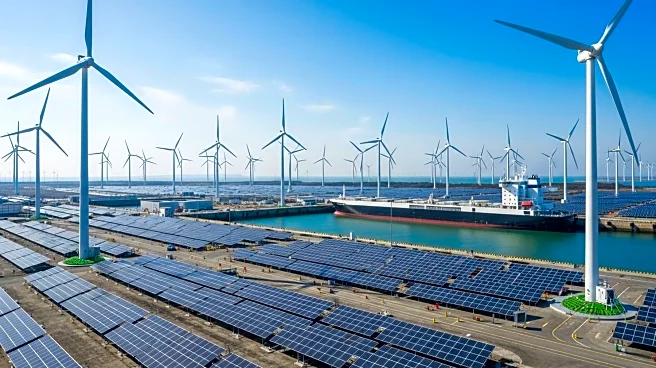What is the story about?
What's Happening?
CleanTechnica has released a whitepaper titled 'From Quay to Sea: A Port Decarbonization Roadmap,' which outlines strategies for reducing emissions at ports. The roadmap is a response to stakeholder demand for a comprehensive plan to address the environmental impact of ports, which are significant sources of emissions due to diesel exhaust and congestion. The strategy involves transitioning from diesel to electric power for equipment and vehicles, implementing shore power for ships at berth, and eventually electrifying coastal and blue-water shipping. The roadmap emphasizes the importance of decarbonization for regulatory compliance, competitiveness, and public health.
Why It's Important?
Ports are crucial nodes in global trade, but they also contribute significantly to local pollution and greenhouse gas emissions. The roadmap's focus on electrification and decarbonization is vital for improving air quality and reducing carbon footprints, which is increasingly important as regulatory pressures mount and public awareness grows. Electrified ports can offer economic advantages by lowering operational costs and attracting environmentally conscious shippers. This shift is essential for maintaining competitiveness in a global market that is moving towards sustainable practices.
What's Next?
The roadmap suggests a phased approach to decarbonization, starting with ground vehicles and moving to harbor vessels and shore power. Ports are encouraged to invest in renewable energy sources like offshore wind and solar to meet increased electricity demands. The transition will require significant investment and collaboration among port operators, regulators, and grid planners. As ports implement these strategies, they will need to navigate potential challenges such as grid expansions and supply chain uncertainties.
Beyond the Headlines
The decarbonization of ports has broader implications for global trade and local communities. As fossil fuel trade declines, ports will need to adapt to changing cargo types and volumes. Electrified ports can improve public health by reducing local air pollutants, benefiting nearby urban populations. The roadmap also highlights the ethical responsibility of ports to minimize their environmental impact and contribute to global sustainability efforts.

















